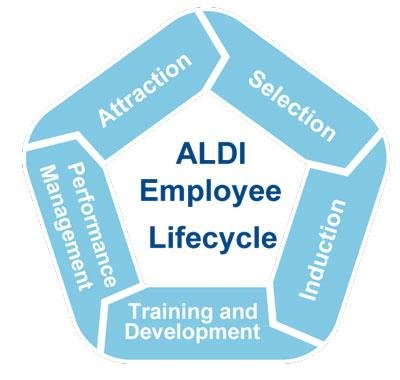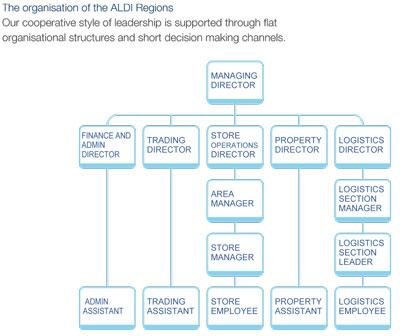Aldi is one of the world’s leading grocery retailers with more than 7,000 stores across 70 countries. The company originates from Germany, where it was founded in 1913 as one of the first retailers to offer self-service. Aldi has operated in the UK since 1990, and now has over 500 stores employing in excess of 20,000 people. Aldi is one of the world’s largest privately owned companies and its stakeholders include suppliers, customers, employees and the communities in which it operates.
A stakeholder is any person or group that has an interest in the success of a business. Aldi’s focus on its stakeholders and delivering against their individual needs is one of the reasons for the business’s success and rapid growth.
Aldi’s approach is one that promotes quality and value above all else. Aldi creates efficiencies at every level from the building of stores through to in-store displays and the specific ranges of goods stocked. This ensures that prices remain low and savings are passed onto customers, avoiding gimmicks and ‘specials’ such as ‘Buy One Get One Free’.
Aldi’s has developed close, long-term relationships with its suppliers, believing that longevity and trust in its business relationships are essential to ensure high quality and reliable products. Employees are supported throughout their time at Aldi and the business is always keen to be at the forefront of recruitment and training systems. Aldi also takes a responsible attitude to the communities in which it works, with all activities framed by its Corporate Responsibility (CR) policy. This study considers how Aldi ensures the support of its key stakeholder groups.
Employees
Businesses such as Aldi have both internal and external stakeholders. Internal stakeholders are those who are part of the business, such as employees and shareholders.
Aldi’s key internal stakeholder is its employees. Aldi wants every employee to have a rewarding career, with opportunities to grow and develop, whether they work in stores, the distribution center or in management teams. Aldi expects its people to be committed, hard-working and take ownership of their responsibilities. In return, employees receive market leading salaries and unrivalled progression opportunities within the retail sector. Aldi values the experience of its teams and offers a range of benefits to reward long service.
Aldi’s key internal stakeholder is its employees. Aldi wants every employee to have a rewarding career, with opportunities to grow and develop, whether they work in stores, the distribution centers or in management teams.

Aldi expects its people to be committed, hard-working and take ownership of their responsibilities. In return, employees receive market-leading salaries and unrivalled progression opportunities within the retail sector. Aldi values the experience of its teams and offers a range of benefits to reward long service.
Aldi seeks to attract the best talent and has one of the highest advertised starting salaries for its graduates in the UK and Ireland of £41,000. Over 85% of its Directors are recruited from within the company, demonstrating the importance placed on training and development and rewarding performance. Aldi has developed a range of high quality, structured training programmes to enable its employees to fulfil their roles successfully.
Aldi is able to deliver excellent customer service due to its highly motivated and skilled workforce. In order to meet the increased recruitment demands placed on the business, Aldi launched the Aldi Academy last year. The Academy is a new national department to improve and standardise the training and recruitment processes at each stage of the employee life cycle. Projects to improve processes, systems and practice include:
- Improved recruitment and selection processes
- A new applicant tracking system
- A new learning management system
- Updated training workbooks
- Updated training courses
- Redesigned performance review documents.
Aldi is keen for its employees to develop and to use their own judgement in their specialist areas. From the moment they start, with a thorough induction, staff are given trust and responsibility. Their efforts are recognised and, through regular performance reviews, are motivated to improve. Aldi’s management structure is designed to encourage cooperative decision making and foster a sense of trust.
For those with a degree, Aldi has a Graduate Area Management Programme that is one of the most rewarding and sought-after in the UK.
Graduates are trained in all aspects of the business, from store operations to finance, property to logistics and after a year are expected to be a fully functioning Area Manager,
looking after three to four stores. Staff and trainees at all levels are encouraged to ‘treat others as they would wish to be treated’.

Suppliers
Aldi believes that quality products should be made responsibly and is committed to an ethical supply chain. This means that making or growing goods does as much good and as little
harm as possible to the communities and environments in which it takes place. This includes a clear regard for workers’ and human rights. Aldi makes sure that the products it sells have all been grown, caught and made with care for the environment and that all workers are treated fairly. It’s important to Aldi that it is seen as a trusted company.
Suppliers are one of Aldi’s external stakeholders. Suppliers are organisations or individuals that have an interest in the success of the business but are not a direct part of it. Aldi maintains a good relationship with its suppliers to achieve the shared goal of putting customers first. Nearly half of all Aldi’ products are produced in the UK, with its range of everyday fresh meats being 100% British. It also offers regionally sourced fruit and vegetables, helping consumers to access a good product range, and promoting sustainability. The UK’s experience as a food manufacturer helps Aldi develop high quality products at low cost.
Ethical Working Conditions
Many of Aldi products are grown and manufactured in developing countries where social and environmental standards can be below acceptable norms. Aldi believes that everyone involved in producing our products should be treated fairly and with respect for their human rights, without exploitation. Together with their business partners, Aldi strive to establish and maintain social and environmental compliance standards within its supply chain. The Aldi
Supplier Standards are set out in the CR policy and reflects the minimum requirements, wherever possible Aldi try to exceed the minimum requirements.
Suppliers are included as part of the Aldi contractual Terms and Conditions, which all suppliers are required to sign prior to entering into business with Aldi. Suppliers in turn are expected to apply them to all subcontractors along the entire production process.
The Aldi Supplier Standards reflect a commitment to human rights and fair labour standards and are based upon the following:

Monitoring the supply chain
Aldi has a Social Monitoring Programme in place that focuses on suppliers in high risk commodity areas, such as textiles. These are chosen due to their tendency to be manufactured in countries with lower social and environmental standards than in the UK.
As part of this programme suppliers must become members of the Supplier Ethical Data Exchange (Sedex), or The Business Social Compliance Initiative (BSCI) these are not-for profit organisations for businesses committed to improving ethical standards in their supply chain. Individual profiles of supplying sites together with ethical audit data is shared via an online, independent database, improving the transparency of the supply chain.
Audits by independent third-party organisations confirm that suppliers meet our ethical targets. These targets are based on the supplier’s ability to demonstrate continual improvement, both qualitative and quantitative, in the ethical standards of their production sites. Supplier sites that do not meet our standards in one or more areas need to demonstrate progress against these or commit to taking remedial action within a
given timeframe.
Customers

Customers are at the heart of everything Aldi seeks to achieve. Aldi informs customers of what is happening in stores and listens to what they need, including their ethical concerns. Its promise is to always deliver quality goods at the best possible price. Aldi’s operational model strips out additional costs and these efficiency savings allow Aldi to offer ‘Everyday Low Prices’ and high quality products.
The idea of ‘quality’ means much more than just ‘fit for purpose’. Aldi looks at all the aspects of quality – from ethical production to the final customer purchase. This includes a concern for customer safety, health and wellbeing. It helps its customers to eat a healthy and balanced diet by making sure that all products meet national quality and safety standards, including clear information and labelling. Aldi works with experts, the government and other bodies to promote healthy choices. It has:
- signed up to 14 of the government’s Responsibility Deal Pledges. These include lower salt levels and removing trans-fats.
- teamed up with Change4Life to encourage and promote healthier lifestyles.
- worked with an independent nutritionist to reduce the amount of calories and salt in products.
Conflict could arise between suppliers – wanting to supply less healthy choices – and customers. Aldi would always look at what is best for the customer.
Communities
The communities in which both shoppers and staff live and work are also stakeholders. To lower its environmental impact, Aldi works to reduce its carbon footprint through being energy efficient; minimising the impact of its refrigerant liquids and by meeting leading global standards for green buildings. In terms of its waste, it follows the practice of ‘reduce, reuse, recycle’ Aldi places great importance on supporting its communities, set out through its CR Policy. The business begins this relationship from the moment it decides to construct a store. For instance, in Knutsford, Cheshire, Aldi supported a number of community initiatives before the opening of a store in the town. Aldi’s community engagement sought to create goodwill, introduce local shoppers to the brand and its products, and to build long lasting relationships. Aldi supported a number of community barbeques in association with local schools with free products and a chef, and the Knutsford Sunday in the Park community fundraiser event, raising funds for the Children’s Burns Foundation. In addition, Aldi sponsored the Egerton Youth Football Club, providing funds for youth sport throughout the season.
Sponsorship also brings benefits to both Aldi and its communities, helping raise awareness and perception of the Aldi brand from a recruitment perspective. ‘Awareness’ is just knowing it exists; ‘perception’ includes what the brand stands for and its overall aims. In this case, Aldi is keen to attract high quality applicants to its graduate recruitment programme and sponsors several high profile sports teams at various universities which has in turn produced several graduates for Aldi’s Area Manager Programme.
Last year, Aldi sponsored the varsity fixtures between the Universities of Bath and Exeter. The sponsorship agreement covered matches between a number of sports teams including men’s football, men’s rugby league, women’s football, basketball, netball, water polo and the cheerleaders at events. Aldi had naming rights to the event, described as: “Aldi Best of the South West Varsity” and the Aldi logo was printed on the front of all team kits. Promotion was through Aldi branded fliers and press releases in local newspapers. There was prominent use of the Aldi logo, including on 33 plasma screens in the student centre. Hoardings promoting Aldi’s graduate recruitment were also displayed at events.
Conclusion
Aldi is one of the fastest growing dynamic companies in the world. It competes successfully in the UK supermarket sector by providing quality goods at low prices and is keen to maintain good relationships with all of its stakeholders. Staff are treated well and trusted, and the Aldi Academy will ensure a steady stream of good graduates who can take on management positions as the business continues to expand. The Aldi supply chain is built with the environment and communities in mind, with Aldi’s culture creating long lasting relationships. Customers are the stakeholder group that are at the heart of the Aldi ‘family’ who are able to rely on quality products, responsibly sourced, and at low prices.
